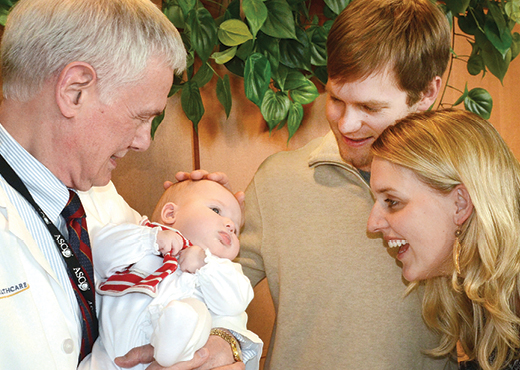Neil Gaines was enjoying the happiest time of his life — graduating from the University of Georgia, falling in love, getting a job — when he hit a bump in the road.
Actually, the bump hit him. It was growing on his back as a small mole. Neil wanted it excised for the same reason anyone would.
"I just wanted it removed because it was ugly," says the 27-year-old Gainesville, Ga., native. "I didn't think anything of it."
But it wasn't that easy. Gaines learned he had stage 3 melanoma, a type of skin cancer that can be very aggressive and difficult to treat. His bump in the road in 2008 led to a detour with five surgeries, countless injections, and three months in intensive care.
But with the help of his then-fiancee Margaret, a loving family, and Emory oncologist David Lawson, Gaines is thriving today. He and Margaret, now a nurse, married in 2011, and they are committed to raising awareness about melanoma. They also were so happy with the care at Winship that they decided to donate proceeds this year from their annual MelaNoMo fundraiser to Winship.
"Dr. Lawson, Necia, the whole team gave us so much that we want to do all we can to help them find answers to treating other patients," Gaines says. "We want to raise awareness that skin cancer can be a deadly disease."
Gaines didn't know the story of Roth or just how serious melanoma can be — until he was diagnosed with it. "It's just skin cancer," he thought. "How serious can that be?" But he learned the answer soon enough.
A disease too frequent among the young
Gaines credits his wife, parents, brother Graham, sister Kelley, and a wide circle of friends for the support that kept him from growing discouraged during the dark days of his treatment.
Graham Gaines, two years older, says that watching his younger brother go through painful treatments was the hardest thing he has ever been through.
"I just wished I could have traded places with him," he says.
Tracy Gaines, Neil's mother, says that keeping her son's spirits up became a family effort. And she credits her daughter-in-law for standing by her son when other young people might have been unable to handle it.
"But they are so much in love and so happy," she says, "that it's just great to see how they've made it through this."
Prevention, early detection, and research are key
One of the ways they have survived is by taking on educational and fundraising efforts. They want to inform other young people of the importance of skin protection; melanoma among younger people has been on the rise at an alarming rate for decades. From 1970 to 2009, the incidence of melanoma increased by eight-fold among young women and four-fold among young men, according to the National Institutes of Health. One reason is sun exposure, but another huge culprit is tanning bed usage, particularly among young, white women.
While Gaines does not know whether sun exposure caused his melanoma, he does know that sun exposure is a risk factor for the disease.
In addition to raising awareness, Gaines and his family also have been holding an annual fundraiser, called MelaNoMo', since 2009 — while he was still in the middle of treatment — to raise money for research to fight the disease. This year the family decided they wanted the money to stay in Georgia and, more specifically, to go to Winship, where Gaines believes his money will be put to best use.
"Winship has done so much for us, and Dr. Lawson and all of his team couldn't have been better if I had been their own family," he says. "And I believe in the work that Winship does. If anyone can find cures for this disease, it will be Dr. Lawson and his team."
Lawson is one of the nation's experts in treating melanoma and was co-author of an influential New England Journal of Medicine article in 2011 that shows that vaccine, when combined with Interleukin-2, an immunotherapy drug, improves response rate and progression-free survival. Recently he presented findings at the American Society of Clinical Oncology meeting that stereotactic radiosurgery combined with the melanoma drug, ipilimumab, appears to be safe and associated with an impressive increase in median overall survival in patients with brain metastases from malignant melanoma.
In late 2011, after three difficult years, Gaines received happy news. When he went to see Lawson in November of that year, Lawson was able to tell him: there was no evidence of disease.

